- Home
- Rachel Caine
Heartbreak Bay (Stillhouse Lake)
Heartbreak Bay (Stillhouse Lake) Read online
PRAISE FOR STILLHOUSE LAKE
“In this rapid-fire thriller . . . Caine spins a powerful story of maternal love and individual self-realization.”
—Publishers Weekly
“Amazing.”
—Night Owl Reviews (Top Pick)
“A chilling thriller . . . Stillhouse Lake is a great summer read.”
—Criminal Element
“Stillhouse Lake is a true nail-biter right up to the end.”
—Fresh Fiction
“Highly entertaining and super intense!”
—Novel Gossip
“What a fantastic book!”
—Seattle Book Review
OTHER TITLES BY RACHEL CAINE
Stillhouse Lake Series
Bitter Falls
Wolfhunter River
Killman Creek
Stillhouse Lake
The Great Library
Paper and Fire
Ink and Bone
Ash and Quill
Smoke and Iron
Sword and Pen
Weather Warden
Ill Wind
Heat Stroke
Chill Factor
Windfall
Firestorm
Thin Air
Gale Force
Cape Storm
Total Eclipse
Outcast Season
Undone
Unknown
Unseen
Unbroken
Revivalist
Working Stiff
Two Weeks’ Notice
Terminated
Red Letter Days
Devil’s Bargain
Devil’s Due
Morganville Vampires
Glass Houses
The Dead Girls’ Dance
Midnight Alley
Feast of Fools
Lord of Misrule
Carpe Corpus
Fade Out
Kiss of Death
Ghost Town
Bite Club
Last Breath
Black Dawn
Bitter Blood
Fall of Night
Daylighters
The Honors (with Ann Aguirre)
Honor Among Thieves
Honor Bound
Honor Lost
Stand-Alone Titles
Prince of Shadows
Dead Air (with Gwenda Bond and Carrie Ryan)
This is a work of fiction. Names, characters, organizations, places, events, and incidents are either products of the author’s imagination or are used fictitiously. Any resemblance to actual persons, living or dead, or actual events is purely coincidental.
Text copyright © 2021 by Rachel Caine, LLC
All rights reserved.
No part of this book may be reproduced, or stored in a retrieval system, or transmitted in any form or by any means, electronic, mechanical, photocopying, recording, or otherwise, without express written permission of the publisher.
Published by Thomas & Mercer, Seattle
www.apub.com
Amazon, the Amazon logo, and Thomas & Mercer are trademarks of Amazon.com, Inc., or its affiliates.
ISBN-13: 9781542093675
ISBN-10: 1542093678
Cover design by Shasti O’Leary Soudant
To the amazing Dr. Reese, Dr. Lamont, Dr. Potter, and especially miracle workers Gracie Rosenberry and Faith Newsome.
Much love to the amazing Mary Crowley Cancer Research Center’s work into rare cancer.
To Sarah, Lucienne, Tez, and Gemma—always first to cheer.
This book would not be possible without the kind support of Liz Pearsons, who has always understood Stillhouse Lake and all its players, and believed in the impossible.
Finally, to my beloved husband, Cat: Thank you. Always.
CONTENTS
PROLOGUE
1 GWEN
2 GWEN
3 KEZIA
4 GWEN
5 KEZIA
6 SAM
7 GWEN
8 KEZIA
9 GWEN
10 KEZIA
11 GWEN
12 SAM
13 GWEN
14 KEZIA
15 GWEN
16 KEZIA
17 GWEN
18 SAM
19 KEZIA
20 GWEN
21 SAM
22 GWEN
23 GWEN
24 KEZIA
25 GWEN
26 SAM
27 GWEN
28 KEZIA
29 GWEN
EPILOGUE
ACKNOWLEDGMENTS
PLAYLIST
AUTHOR’S NOTE
ABOUT THE AUTHOR
PROLOGUE
There was something eerily hypnotic about driving at night. The wheel felt warm and almost alive under her hands. She felt alive, for the first time in a long time. Energy jittered through her veins, anticipation like metal pressing on her tongue—so sharp she could taste it. The night was dark, but in the morning everything, everything would be new and wonderful. She could imagine the sunrise washing everything pink and yellow and perfect.
She just had to make it through to the other side. And she could. Morning was within reach, and she was ready.
Thinking of that gave her real peace, for the first time in a long while.
Peace cracked in half when she heard a rustle from the back seat, then a fretful cough, then an intake of breath. She felt a surge of raw, tired fury.
Don’t cry, don’t you dare cry . . .
The first wail was loud enough to shatter glass, and just an instant later came the out-of-tune chorus of the second child. She felt her whole chest collapse under the weight of sheer, brutal frustration. Her eyes blurred with tears, and she wiped them away as she thought, It’s okay, it’s okay, it will all be okay, you know what to do. She reached out with a trembling hand and switched on the radio, turned it up, and forced herself to keep breathing, breathing as the children shrieked. Hush, sweeties, she mouthed, but didn’t say because she couldn’t be heard anyway, and they wouldn’t understand.
Morning was on the way. She tried to imagine the dawn glowing on that black horizon, guiding her into the future. The music would help. It had to help.
She drove into the long, cold tunnel of the night, listening to screams until screams turned to hiccups, then slowly died to fretful, mewling cries, and finally back to silence. She turned the music down and took a left turn from the narrow, lightless road onto another, watching the GPS on her cell phone; it was the only way to navigate out here in the wilderness. Rural Tennessee was as black as the bottom of a well this time of night. No communities to speak of anywhere close; she could just make out a faint glow on her left that would be Norton, most likely. She was up in the sparsely populated foothills—some paranoid compound types hoarding guns, maybe a few old family cabins that hung on by hunting their own food. Nobody to note her passing by.
She’d made this drive a solid, patient routine. Nights and nights and nights like this, always the same schedule. Plenty of rural roads, less-traveled paths. She didn’t mind. The girls were always so difficult to settle, all her neighbors knew that. She’d seen them giving her that look, that can’t you keep them kids quiet look, so many times.
She stared in the rearview mirror at the babies, and felt tears come. Hopeless, helpless, angry tears. I love my kids. I do. This is for the best. Tomorrow would be different. Tomorrow, everything would be right. She just had to hang on to that.
She coasted the car to a gentle stop and rolled the window down. The sound of frogs hit her first: a chorus so loud it felt like a drill in her ear. The road she was on was paved, but only just, and fraying at the edges into sediment and mud. No way to t
urn around.
It stank out here, in the pit of the night. Murky water and rot. Not clean, like the lakes. This place was pitted with old, stagnant ponds, rank with algae.
Folks stayed away for a reason.
She sat and hummed tunelessly to herself and listened to the night chorus for the longest time. The girls were quiet, and when she looked in the rearview mirror, she saw their angelic little faces relaxed and calm in sleep.
I should just turn around and forget, she thought. But the truth was, if she did, if she drove on home, she’d be out here again—tomorrow, next week, next month. She knew herself too well to think she was going to change that much. The flutter in her stomach, the itch to move on . . . that was so strong now it was just unbearable. Only the driving had helped these past few weeks.
It wouldn’t help much longer.
The flash of headlights in the distance caught her by surprise, and she almost gasped. Then she sighed in relief, because it meant the waiting was done. Now she felt an upswell of excitement, of promise, of morning on the horizon.
“It’s going to be all right,” she sang to her babies. They barely shifted in their sleep. “Momma’s going to take care of everything.”
She just had to choose to be strong.
1
GWEN
It all starts so sweetly, because on Friday night, the adoption papers come through.
Sam Cade, my lover, my partner, is now officially the father of my two children, Lanny and Connor Proctor. And when the court documents arrive, we sit down with the kids, and we all eat cake and cry and hug, and there is so much love, so much, that it fills me to bursting. And the whole weekend seems wonderful. Better than ever.
But I wake up in the dark predawn hours of Monday with a pounding heart and the instant, heavy conviction that something is wrong. There’s a faint, bloody taste in the back of my throat, the residue of a nightmare that slips into fog before I can remember it.
Except for the whisper, the last soft word. Gina. My old name, dead to me now because Gina Royal, the ex of a serial killer, is a memory, a ghost. And I know that dream voice so well that I feel a rush of adrenaline flood my veins. I have to tell myself that it isn’t real, can’t be real, that my ex-husband, Melvin Royal, is dead and gone and rotting in the ground. But my body doesn’t care about logic. It just reacts to him in ways that I can’t control . . . even if he’s just a product of my haunted imagination.
I know why he’s haunting me. He doesn’t like being replaced in the lives of his children. But Melvin Royal, monster, doesn’t deserve to be remembered at all.
Burn in hell, Melvin.
I breathe until my pulse slows, the taste goes away, the adrenaline shakes subside.
Finally, I glance at the clock. It’s 4:00 a.m. I turn slightly and feel Sam’s warmth next to me; my lover isn’t getting up yet, and he’s gently snoring. Undisturbed. I try curling into him, our bodies fitting together like puzzle pieces. It ought to bring me some kind of peace, take me back to dreamland.
But I feel a restless prickle of hair at the back of my neck. The nightmare is gone, but something’s still not right. I’ve learned to pay attention to primal instincts. They’ve saved my life more than once.
I slide out of bed without waking him—or so I think, until I’m reaching for the closed bedroom door. Sam’s voice, when it comes, is completely alert. “Is it the kids?”
“I don’t know,” I tell him. “I’m just checking. Probably nothing.” I don’t want to tell him about the dream. Melvin’s a shadow that always lies between us, for good reason. And the dream has nothing to do with my current anxiety.
“Well, I probably could use a glass of water anyway,” he says in a no-big-deal tone. He’s already up, shoving feet into shoes. I’ve done it, too—reflex, always be ready to run. It’s spring, but early morning’s still chilly; I feel the cool air on my bare legs as I swing open the bedroom door.
I’m instantly disoriented. This isn’t my hallway. It’s too wide, and the carpet’s the wrong color. I feel wildly out of time and place, and then it all steadies around me. I’m remembering the old house, the one on Stillhouse Lake. We’ve moved. The lake house, currently rented out, is on the market but hopefully will sell in the next couple of months. We’re in Knoxville now. A new house. New, friendly neighbors. Good schools. Everything is fine.
Except the insistent pull at the back of my neck tells me it’s not.
Gina, Melvin’s whisper says from the back of my mind. You can run all you want. But you can never run far enough.
You’re dead, I tell him. That’s far enough.
The hallway’s dark, just night-lights along the baseboard to illuminate the way. Connor’s room is first on the right from ours; I ease his door open a crack and see that my son is not asleep. He’s sitting up, staring into the darkness. He turns, and his face is pale. “Did you hear it?” he asks me in a low whisper. He’s not my little boy anymore, except in moments like this; he’s got the growth of fifteen. I still want to take him in my arms and rock him, but I don’t. I’m starting to realize how difficult it is that even my youngest isn’t a baby anymore. That I have to let him grow up.
“It’s okay,” I tell him. Sam’s behind me in the doorway. “We’ve got this. You know the plan?”
He nods. He does. Everybody in this house knows the plan.
I close his door, and I hear him get up and throw the interior deadbolt I installed for safety. Good. Step one: delay an intruder from getting into his room. Step two: if the all clear doesn’t come within a few minutes, hit the silent-alarm button that signals an alert straight to the Knoxville police. Step three: Get out through his bedroom window, run for help. Don’t stop for anyone or anything.
We all know the plan because there’s always a chance we’ll have to use it.
I go to the bathroom. It’s dark, but I check the window anyway. Firmly closed and locked and too small for most intruders to slip through. Then I continue to my daughter’s bedroom. It’s also dark, but when I open it up, I catch a whiff of fresh, damp outside air. Her window’s closed, but it hasn’t been for long.
Dammit.
I flip on the light, and Lanny—Atlanta, but no one except teachers uses her full name—groans and turns over to glare at me. She’s still wearing club makeup—dark glitter around her striking eyes, painted silver stars on her cheeks. She’s dyed her hair into a shimmering rainbow of colors. “What?” she snaps, and groans into her pillow. “Mom!”
I have to swallow a volcanic explosion of frustration and anger and fear. “Where were you?”
“Nowhere.”
“Lanny. You obviously just came in. You left your window out of the alarm circuit, again. Do you know what kind of danger you’re exposing your little brother to when you do that?” Sometimes, that appeal works.
Not tonight. She rolls up in her covers and throws the pillow over her head. “Would you just leave me alone? It was a good day, why do you have to ruin everything?”
My daughter is seventeen-going-on-thirty, and there’s not a lot I can do about it. She knows it’s not safe out there. She’s determined not to care, or to prove that she can handle whatever comes at her. It terrifies me. It also exhilarates me that my child is so strong, when fear of losing her isn’t tearing me apart. But she’s not an adult yet, and I know I have to find a way to keep her in line for another year until she can freely make her own choices. Her own ghastly mistakes that I can’t prevent, and consequences I can’t save her from. That’s the hell of being who we are: the normal stumbles of most girls her age are different for the child of Melvin Royal. Stakes are always, always higher.
I want to roll my children in Bubble Wrap and set them safely on a shelf and never, never let the world chip and crack them. But they’re not made of porcelain, and no matter how strong that protective desire might be, I have to fight it. I have to relax my grip, not tighten it.
I can yell at her, but I’ve tried that before. Lanny, like me, is stubbor
n. I’ll have to be smarter, not louder. I’m acutely afraid that my independent, brave, smart, sometimes reckless daughter might just . . . leave. Run away. And on her own, she’ll be unprotected.
I need to find a way to keep her with us just a little while longer. I know I have to face losing her to the world, whatever danger that brings.
But not yet.
“We’ll talk later,” I say. She groans again, this time in rejection of the whole idea. I shut the door and leave her without another word. When I turn, Sam’s watching me with level, calm intensity, and when I sigh, he just shakes his head. He understands. Better than I have any right to expect.
“Do you think she was out with Vee?” he asks me.
“Probably,” I tell him. Vee—Vera Crockett, late of the rotten little town of Wolfhunter, Tennessee—became our responsibility not long ago, but Vee has never let anyone rule her for long. After just a few weeks living with us here in Knoxville, she pushed for emancipated-minor status; thing is, she had it anyway because she’s never obeyed anyone’s rules, and if I hadn’t helped her get it legally, she’d have just taken off and lived rough. Again. So we helped, and at least it ensured that Legally Emancipated Vee stayed relatively close in case of trouble.
Vee’s a girl with a lot of damage, but I do have faith in her. She’s not broken. At least not any more than the rest of us. And it’s exactly right for Vee—the same age as my daughter—to have talked Lanny into sneaking out and clubbing, against strict house rules.
“Maybe I should take it out on Vee,” I say. “Without her, Lanny wouldn’t be taking these kinds of risks.”
“Look in the mirror and tell me where she gets her risk-taking gene again?”
“Well, Vee’s enabling her.”
“I’m not saying what they get up to is safe, but at least we know that Vee’s a survivor. She’ll fight like hell to protect Lanny. You know that. And you’re going to have to let Lanny live her life, eventually.”
I do. That’s the hell of it.
I knock the all clear on Connor’s door, and Sam and I settle on the couch in the living room. I feel rather than hear his long sigh. “Girls,” he says. “God, I love them, and at the same time I have no idea what to do at times like this. Is that stupid?”
“Normal,” I say, and lean into his embrace. “Girls are tough at this age. Regretting signing those papers already?”

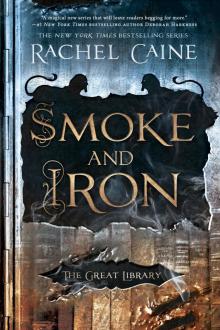 Smoke and Iron
Smoke and Iron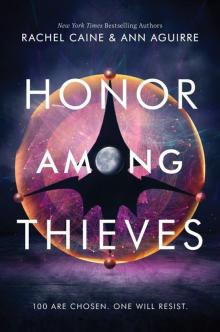 Honor Among Thieves
Honor Among Thieves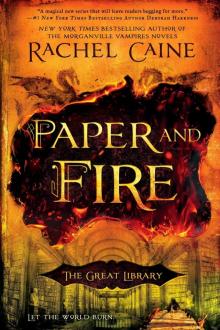 Paper and Fire
Paper and Fire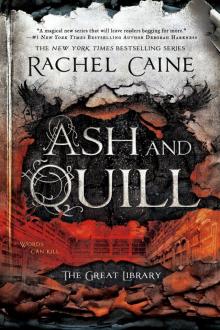 Ash and Quill
Ash and Quill Wolfhunter River (Stillhouse Lake Book 3)
Wolfhunter River (Stillhouse Lake Book 3) Undone
Undone Glass Houses
Glass Houses Prince of Shadows
Prince of Shadows Unseen
Unseen Midnight at Mart's
Midnight at Mart's The Dead Girls Dance
The Dead Girls Dance Last Breath
Last Breath Stillhouse Lake
Stillhouse Lake Daylighters
Daylighters Midnight Alley
Midnight Alley Black Dawn
Black Dawn Fall of Night
Fall of Night Two Weeks Notice
Two Weeks Notice Bitter Blood
Bitter Blood Carpe Corpus
Carpe Corpus Kiss of Death
Kiss of Death Ghost Town
Ghost Town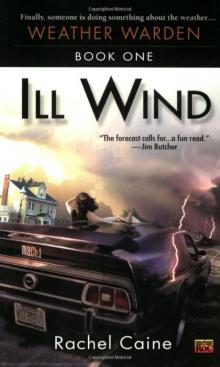 Ill Wind
Ill Wind Fade Out
Fade Out Total Eclipse
Total Eclipse Honor Lost
Honor Lost Thin Air
Thin Air Black Corner
Black Corner Firestorm
Firestorm Bite Club
Bite Club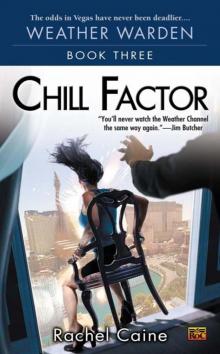 Chill Factor
Chill Factor Windfall
Windfall Oasis
Oasis Devils Bargain
Devils Bargain Terminated
Terminated Feast of Fools
Feast of Fools Lord of Misrule
Lord of Misrule Devils Due
Devils Due Ladies' Night
Ladies' Night Gale Force
Gale Force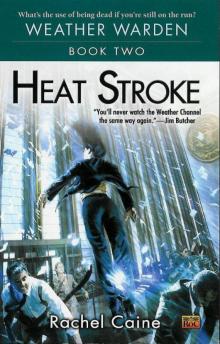 Heat Stroke
Heat Stroke Killman Creek
Killman Creek Sword and Pen
Sword and Pen Cape Storm
Cape Storm Unbroken
Unbroken Windfall tww-4
Windfall tww-4 Heartbreak Bay (Stillhouse Lake)
Heartbreak Bay (Stillhouse Lake) Daylighters: The Morganville Vampires
Daylighters: The Morganville Vampires Duty
Duty Honor Bound
Honor Bound Unseen os-3
Unseen os-3 Firestorm tww-5
Firestorm tww-5 Blue Crush
Blue Crush Devil s Bargain
Devil s Bargain Prince of Shadows: A Novel of Romeo and Juliet
Prince of Shadows: A Novel of Romeo and Juliet Bite Club mv-10
Bite Club mv-10 Terminated tr-3
Terminated tr-3 The Morganville Vampires 14 - Fall of Night
The Morganville Vampires 14 - Fall of Night Bitter Blood tmv-13
Bitter Blood tmv-13 Falling for Grace
Falling for Grace The True Blood of Martyrs
The True Blood of Martyrs Fall of Night (The Morganville Vampires)
Fall of Night (The Morganville Vampires) Devil's Bargain rld-1
Devil's Bargain rld-1 The Morganville Vampires (Books 1-8)
The Morganville Vampires (Books 1-8)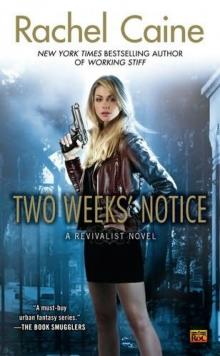 Two Weeks' Notice tr-2
Two Weeks' Notice tr-2 An Affinity for Blue
An Affinity for Blue Caine, Rachel-Short Stories
Caine, Rachel-Short Stories Kiss of Death tmv-8
Kiss of Death tmv-8 WITCHGRAVE
WITCHGRAVE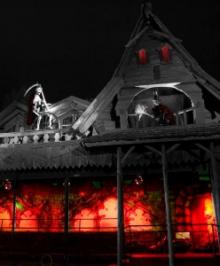 Dark Rides
Dark Rides The Morganville Vampires
The Morganville Vampires Killman Creek (Stillhouse Lake Series Book 2)
Killman Creek (Stillhouse Lake Series Book 2) Midnight Bites
Midnight Bites Line of Sight
Line of Sight![Morganville Vampires [01] Glass Houses Read online](http://i1.bookreadfree.com/i1/03/30/morganville_vampires_01_glass_houses_preview.jpg) Morganville Vampires [01] Glass Houses
Morganville Vampires [01] Glass Houses Black Dawn tmv-12
Black Dawn tmv-12 Midnight at Mart ww-103
Midnight at Mart ww-103 Feast of Fools tmv-4
Feast of Fools tmv-4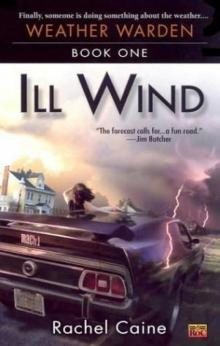 Ill Wind tww-1
Ill Wind tww-1 Devil's Due rld-2
Devil's Due rld-2 Black Dawn: The Morganville Vampires
Black Dawn: The Morganville Vampires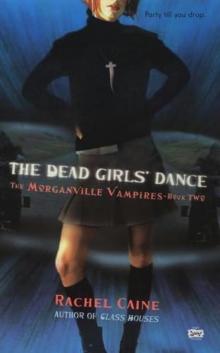 Dead Girls' Dance tmv-2
Dead Girls' Dance tmv-2 Minute Maids
Minute Maids Carpe Corpus tmv-6
Carpe Corpus tmv-6 Total Eclipse tww-9
Total Eclipse tww-9 Ghost Town mv-9
Ghost Town mv-9 Lord of Misrule tmv-5
Lord of Misrule tmv-5 Faith Like Wine
Faith Like Wine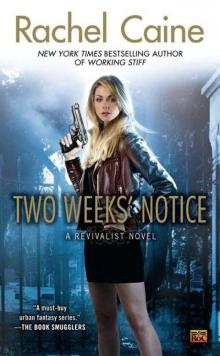 Two Weeks' Notice: A Revivalist Novel
Two Weeks' Notice: A Revivalist Novel Daylighters tmv-15
Daylighters tmv-15 Stamps, Vamps & Tramps (A Three Little Words Anthology)
Stamps, Vamps & Tramps (A Three Little Words Anthology) Unbroken os-4
Unbroken os-4 Unknown os-2
Unknown os-2 4 - Unbroken
4 - Unbroken Cape Storm tww-8
Cape Storm tww-8 Last Breath tmv-11
Last Breath tmv-11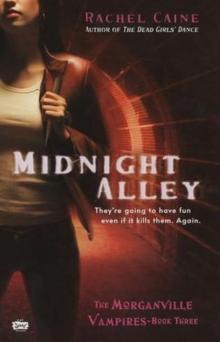 Midnight Alley tmv-3
Midnight Alley tmv-3 Glass Houses tmv-1
Glass Houses tmv-1 Fade Out tmv-7
Fade Out tmv-7 Fall of Night tmv-14
Fall of Night tmv-14 Godfellas
Godfellas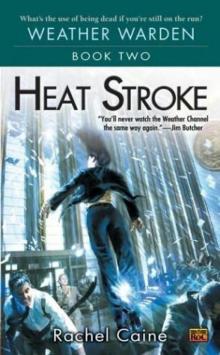 Heat Stroke ww-2
Heat Stroke ww-2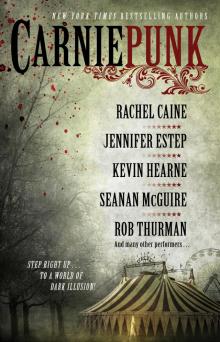 Carniepunk
Carniepunk Oasis ww-102
Oasis ww-102 Gale Force tww-7
Gale Force tww-7 Working Stiff tr-1
Working Stiff tr-1